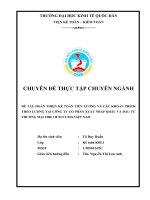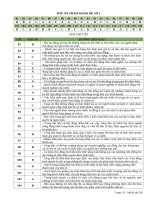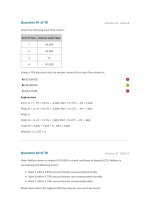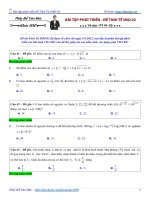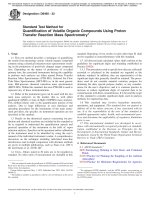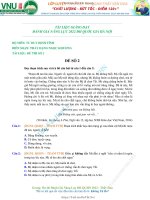02 key concepts of pinch analysis
Bạn đang xem bản rút gọn của tài liệu. Xem và tải ngay bản đầy đủ của tài liệu tại đây (1.09 MB, 28 trang )
Lecture 2: Key concepts of Pinch
Analysis
Do Xuan Truong
Heat recovery and Heat exchange
Basic concepts of heat exchange:
The feed, which starts cold and needs to be heated up, is
known as a cold stream.
Conversely, the hot product which must be cooled down is
called a hot stream.
eat integration course _ Hanoi University of science and technology 2017
Heat recovery and Heat exchange
Basic concepts of heat exchange:
eat integration course _ Hanoi University of science and technology 2017
Clearly, we will need to
supply 180kW of steam
heating and 180kW of
water cooling to operate
the process
Heat recovery and Heat exchange
Basic concepts of heat exchange:
Can we reduce energy consumption?
Yes; if we can recover some heat from the hot stream and
use it to heat the cold stream in a heat exchanger, we will
need less steam and water to satisfy the remaining duties.
eat integration course _ Hanoi University of science and technology 2017
Heat recovery and Heat exchange
Basic concepts of heat exchange:
1. The temperature–enthalpy diagram
eat integration course _ Hanoi University of science and technology 2017
Heat recovery and Heat exchange
1. The temperature–enthalpy diagram
Basic concepts of heat exchange:
eat integration course _ Hanoi University of science and technology 2017
Heat recovery and Heat exchange
1. The temperature–enthalpy diagram
Basic concepts of heat exchange:
eat integration course _ Hanoi University of science and technology 2017
exchange
1. The temperature–enthalpy diagram
eat integration course _ Hanoi University of science and technology 2017
Heat recovery and Heat exchange
1. The temperature–enthalpy diagram
eat integration course _ Hanoi University of science and technology 2017
Heat recovery and Heat exchange
1. The temperature–enthalpy diagram
The resulting T/H plot is a single curve representing all the hot streams, known as the hot
composite curve.
A similar procedure gives a cold composite curve of all the cold streams in a problem
eat integration course _ Hanoi University of science and technology 2017
Heat recovery and Heat exchange
2. A targeting procedure: the “Problem Table” (Linnhoff and
Flower 1978)
Shifted temperatures, which are set at ½ ∆T (5°C in
this example) below hot stream temperatures and ½ ∆T
above cold stream temperatures.
eat integration course _ Hanoi University of science and technology 2017
min
min
Heat recovery and Heat exchange
2. A targeting procedure: the “Problem Table” (Linnhoff and Flower
1978)
eat integration course _ Hanoi University of science and technology 2017
Heat recovery and Heat exchange
2. A targeting procedure: the “Problem Table” (Linnhoff and Flower
1978)
eat integration course _ Hanoi University of science and technology 2017
Heat recovery and Heat exchange
2. A targeting procedure: the “Problem Table” (Linnhoff and
Flower 1978)
any heat available in interval i is hot enough to supply
any duty in interval i +1.
eat integration course _ Hanoi University of science and technology 2017
Assuming that no heat is supplied to
the hottest interval 1 from hot utility,
then the surplus of 60kW from
interval 1 is cascaded into interval 2.
Heat recovery and Heat exchange
2. A targeting procedure: the “Problem Table” (Linnhoff and
Flower 1978)
There it joins the 2.5kW
surplus from interval 2,
making 62.5kW to cascade
into interval 3. Interval 3 has
a 82.5kW deficit, hence after
accepting the 62.5kW it can
be regarded as passing on a
20kW deficit to interval 4.
Interval 4 has a 75kW surplus
and so passes on a 55kW
surplus to interval 5. Finally,
the 15kW deficit in
interval 5 means that 40kW is
the final cascaded energy to
cold utility.
eat integration course _ Hanoi University of science and technology 2017
Heat recovery and Heat exchange
eat integration course _ Hanoi University of science and technology 2017
Heat recovery and Heat exchange
eat integration course _ Hanoi University of science and technology 2017
Heat recovery and Heat exchange
3. The pinch and its
significance
eat integration course _ Hanoi University of science and technology 2017
Golden rules:
● Don’t transfer heat across the
pinch.
● Don’t use cold utilities above the
pinch.
● Don’t use hot utilities below the
pinch.
Heat recovery and Heat exchange
3. The pinch and its
significance
five
simple and effective
concepts:
● Targets: Once the composite curves and Problem Table are known,
we know
exactly how much external heating is unavoidably required.
● The Pinch: Above the pinch the process needs external heating and
below the pinch it needs external cooling. This tells us where to place
furnaces, steam heaters, coolers, etc. It also tells us what site steam
services should be used and how we should recover heat from the
exhaust of steam and gas turbines.
● More in, more out: An off-target process requires more than the
minimum
external heating and therefore more than the minimum external
cooling.
● Freedom of choice: The “heat sink” and the “heat source” are
separate.
● Trade-offs: A simple relationship exists between the number of
streams (process streams plus utilities) in a problem and the minimum
number of heat
eat integration course _ Hanoi University of science and technology 2017
Heat recovery and Heat exchange
4. Heat exchanger network
design
eat integration course _ Hanoi University of science and technology 2017
